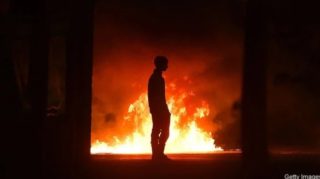The island cannot rely on American help, but armed conflict remains unlikely
CHINA HAS never renounced what it says is its right to “reunify” Taiwan by force if peaceful means are thwarted. So armies on both sides have to prepare for war, however remote it may seem. Of late the number of naval exercises China has conducted has caused alarm—all the more so at a time of worsening relations between China and America on a number of fronts, including American policy towards Taiwan. The delicate status quo, in which China insists Taiwan is part of its territory but the island functions as an independent country, is fraying. As the Global Times, a tub-thumping official Chinese tabloid, puts it: “The possibility of peaceful reunification is decreasing sharply.” Mercifully, that does not mean war is imminent.
On August 28th Taiwan’s president, Tsai Ing-wen, attended the opening of a maintenance facility for the air force’s American-made F-16 fighter jets. In her speech she said she wanted “the world to see our strong will on protecting the country”. China has been staging a series of exercises along its coast. Just in recent days drills covering three different maritime areas have included “realistic” exercises in the Taiwan Strait, at both north and south ends of the island. This follows what China’s press described as a “massive” drill in the strait earlier in the month, designed as both “clear and unprecedented deterrence” and military training. No doubt carrying the same message, on August 10th, Chinese fighter jets crossed the median line in the strait, the unofficial air border.
The drills seem intended to remind Taiwan and America of just how seriously China treats its “sacred mission” of bringing Taiwan back under its sovereignty, but also to flaunt China’s fast-improving military capability. On August 26th it reportedly launched what is said to be the world’s first anti-ship ballistic missile, nicknamed “the aircraft-carrier killer”. That followed what China said was an intrusion by an American spy-plane over a Chinese naval exercises, and visits to the sea by American aircraft-carriers.
It is hard not to see this flaunting of military prowess as part of a more assertive Chinese approach to its region. That has been evident in the South China Sea, where it has been steadily building up a military presence in waters disputed in whole or part by Brunei, Malaysia, the Philippines, Taiwan and Vietnam. China’s claims in the sea have been rejected both by an international tribunal in 2016 and, just last month, by America. Meanwhile, to the north, off China’s east coast, Japan has accused China in recent months of a “relentless” campaign to seize control of the tiny, uninhabited, Japanese-administered Senkaku islands (known in China as Diaoyu).
China’s ruthless approach to Hong Kong has also held a message for Taiwan. The imposition at the end of June of a national-security law in effect ended the autonomy promised under the “one country, two systems” arrangement promised Hong Kong until 2047. That deal was a modified version of one on offer to Taiwan since as long ago as 1981. For a time, it seemed China hoped Hong Kong might serve as an advertisement to Taiwan of the benefits of “peaceful reunification”.
These days Hong Kong is less advertisement than grim warning, which is one reason to worry that China might conclude its patient approach to Taiwan has failed. Another is the perception in Beijing that America might be changing its stance, in a way that would encourage Taiwan to declare legal as well as de facto independence—an event China has always said would be a reason to go to war. China is very sensitive to any hint that America is upgrading relations with Taiwan, for example by having official contacts with its government. That has been especially true under the presidency of Donald Trump, who raised hackles in Beijing by accepting a congratulatory call from Ms Tsai after his election in 2016. In recent weeks a member of Mr Trump’s cabinet, Alex Azar, the health secretary, visited Taiwan and met Ms Tsai (apparently provoking the big war-game and the fighter-jet incursion).
Even more worrying, from China’s point of view, are calls from some politicians and former officials in America for the government to give a more clear-cut commitment to defend Taiwan. At the moment it is bound only by a law passed in 1979 which undertakes “to consider any effort to determine the future of Taiwan by other than peaceful means, including by boycotts or embargoes, a threat to the peace and security of the Western Pacific area and of grave concern to the United States”. This vagueness has been dignified with a clever-sounding euphemism, “strategic ambiguity”.
Elbridge Colby, a former senior Pentagon official and one of the authors of the Trump administration’s national-defence strategy, told the New York Times this month that it was time to end “any remaining ambiguity about how we’d react to the use of force”. Ted Yoho, a Republican representative from Florida, is promoting a “Taiwan Invasion Prevention Act”, to authorise military intervention.
Others argue that, for the four decades since America switched diplomatic relations from Taiwan to China, strategic ambiguity has worked. It has provided enough reassurance to Taiwan that America would not let China invade it unpunished, but not so much confidence that those who favour formal independence have been emboldened to risk it. That delicate balance seems under threat.
China, for its part, is in fact probably confident that if the ambiguity is resolved under Mr Trump, it will be in its favour. In his memoir published this year, John Bolton, one of Mr Trump’s discarded national security advisers, speculates that Taiwan might well be the next American ally to be jettisoned by his former boss. As a Global Times commentator put it this month: “Taiwan for the US is only a tradable chess piece.” After all, Mr Trump has always put “America first”. Trade concessions have always seemed to matter more to him than alliances.
China still has reasons for strategic patience, albeit very different ones. It must realise that any hope of winning public support in Taiwan for reunification is for the foreseeable future a pipedream. But looking at an America consumed by a virus, an economic slump and a vicious election campaign that is unlikely to heal political wounds, it may conclude that its willingness to spill blood to defend Taiwan’s freedom is likely only to diminish. China, by contrast, has no elections, has vanquished the pandemic and has returned to economic growth, and regards Taiwan as non-negotiable and priceless. As it waits, rattling sabres will serve to deter Taiwan’s independent yearnings.
By The Economist





